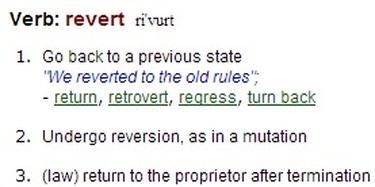
But somewhere along the way, the use of this word went haywire.
In fact, whenever I get emails in which I'm requested to "revert back" to the sender, I dream of reverting to a time when the word was still used correctly.
Everyone from my fellow Indians to non-native speakers to well-educated folk who claim fluent English are guilty here. I'm sure I too have made the mistake in the past.
But now it's time to set the record straight on how to use "revert" correctly, not to point fingers. So let's get to it.
WHAT PEOPLE (WRONGLY) THINK REVERT MEANS:
Commonly found, but nonetheless wrong, usages of revert include:
"It would be great if he reverts by then."
"Kindly revert back."
"Your earliest revert would be highly appreciated."
"Please revert accordingly."
In these instances (taken from my own inbox, incidentally), revert is used as if it meant reply, answer or respond.
But the word means none of these things.
WHAT REVERT ACTUALLY MEANS:
Revert is something or someone returning to a former condition or going back to a previous state of being. For example:
- When ice melts, it reverts to water.
- He tried to quit but eventually reverted to smoking.
- The editor asked the journalist to revert to the previous version of the story.
- Without supervision, the workers reverted to their old ways of doing things.
SO IF NOT REVERT, THEN WHAT?
Here's how one could fix the wrong usages of revert mentioned above:
"Would be great if he replies by then."
"Kindly reply."
"A prompt reply would be much appreciated."
"Please respond accordingly."
IN CONCLUSION:
- Use reply, answer or respond when you want someone to get back to you.
- Do not use revert unless you want to refer to a former version or form of something.
Extra tip: It's simply "revert to", not "revert back to" because back is already implied in revert.
If you found this post helpful and/or know people who could use the tip, feel free to share the knowledge. Hit the "Like" button below and spread the word.
 RSS Feed
RSS Feed